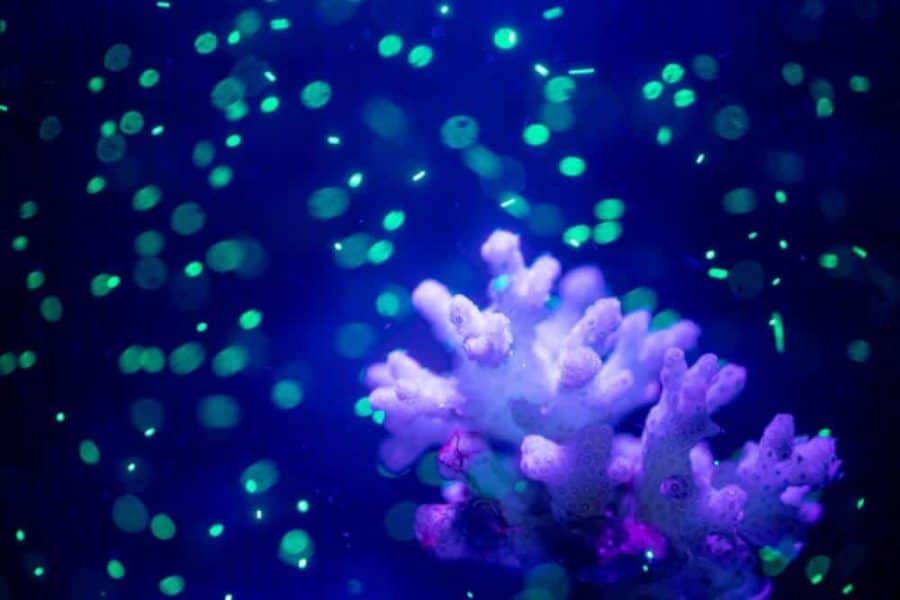In many cuisines, okra serves as a master thickener of stews and soups. The goo from that fruit and other plants, such as aloe, cactus and psyllium, can also clean water and wastewater of some types of solid pollutants, as well as some that are dissolved. Now, researchers have demonstrated that combinations of these food-grade plant extracts can remove microplastics from wastewater.
The researchers will present their results today at the spring meeting of the American Chemical Society (ACS). ACS Spring 2022 is a hybrid meeting being held virtually and in-person March 20-24, with on-demand access available March 21-April 8. The meeting features more than 12,000 presentations on a wide range of science topics.
The health effects of ingesting microplastics — tiny pieces of plastic 5 mm or smaller — are currently unclear, but studies suggest that people unintentionally consume tens of thousands of these particles every year. “We think that microplastics by themselves may not be much of a health hazard, but anything that they get into or any type of toxic substance that gets attached to these plastics could go inside our bodies and cause problems,” says Rajani Srinivasan, Ph.D., the principal investigator for the project.
In the typical wastewater treatment process, microplastics are removed from water in two steps. First, those that float are simply skimmed off the top of the water. However, this step only removes a fraction of the total microplastics that are present. The rest must be removed by adding flocculants, or sticky chemicals that attract microplastics and form large clumps. The clumps then sink to the bottom of the water and can be separated from it.
Srinivasan, who is at Tarleton State University, points out that some of the substances currently used to remove contaminants are potentially harmful, so she and her team have been investigating nontoxic alternatives. For example, one common flocculant, polyacrylamide, can break down into toxic chemicals under certain conditions. “It doesn’t help if we try to clean up water but add potentially toxic substances to remove the pollutants,” she says.
Previously, Srinivasan had studied the use of food-grade plant extracts as nontoxic flocculants to remove textile-based pollutants from wastewater. Her team specifically focused on polysaccharides in the extracts because these biopolymers possess the appropriate chemical and biological properties to attract and capture pollutants like dyes or even bacteria. “I was working with the removal of microorganisms and things like that, and I thought, ‘Why not try microplastics?’” she says.
So, the team of undergraduate and master’s students tested polysaccharide extracts from fenugreek, cactus, aloe vera, okra, tamarind and psyllium — all of which are food-grade materials — as flocculants to capture microplastics. They tested compounds from the individual plants, as well as in different combinations. To do this, they added these extracts to various microplastic-containing water sources. Then, they examined microscope images of the flocculant clumps before and after treatment and counted the microplastics to determine how many particles had been removed.
In their experiments, the researchers found that polysaccharides from okra paired with those from fenugreek could best remove microplastics from ocean water, whereas polysaccharides from okra paired with those from tamarind worked best for freshwater samples. Overall, the plant-based polysaccharides worked better than, or as well as, the traditional flocculant polyacrylamide, depending on the combination of extracts and water source.
Importantly, the plant-based flocculants can be implemented in existing water treatment processes. “The whole treatment method with the nontoxic materials uses the same infrastructure,” says Srinivasan. “We don’t have to build something new to incorporate these materials for water treatment purposes.”
Looking forward, she and her team will continue tailoring the ratios and combinations of plant-based flocculants to optimize removal of different microplastic types from a variety of water sources, such as ocean water, estuary water, freshwater and groundwater. They also plan to scale up their nontoxic microplastics removal process in field studies outside of the lab. Ultimately, they hope to commercialize this new, plant-based method so that microplastics can be removed from water on an industrial scale — enabling cleaner and safer water for everyone to drink.
The researchers acknowledge support and funding from the National Science Foundation (award number 1658984), Tarleton State University and the High Plains Water Development District in Lubbock, Texas.
A recorded media briefing on this topic will be posted Tuesday, March 22, by 10 a.m. Eastern time at www.acs.org/acsspring2022briefings.
ACS Spring 2022 will be a vaccination-required and mask-recommended event for all attendees, exhibitors, vendors, and ACS staff who plan to participate in-person in San Diego, CA. For detailed information about the requirement and all ACS safety measures, please visit the ACS website.
The American Chemical Society (ACS) is a nonprofit organization chartered by the U.S. Congress. ACS’ mission is to advance the broader chemistry enterprise and its practitioners for the benefit of Earth and all its people. The Society is a global leader in promoting excellence in science education and providing access to chemistry-related information and research through its multiple research solutions, peer-reviewed journals, scientific conferences, eBooks and weekly news periodical Chemical & Engineering News. ACS journals are among the most cited, most trusted and most read within the scientific literature; however, ACS itself does not conduct chemical research. As a leader in scientific information solutions, its CAS division partners with global innovators to accelerate breakthroughs by curating, connecting and analyzing the world’s scientific knowledge. ACS’ main offices are in Washington, D.C., and Columbus, Ohio.
To automatically receive press releases from the American Chemical Society, contact [email protected].


